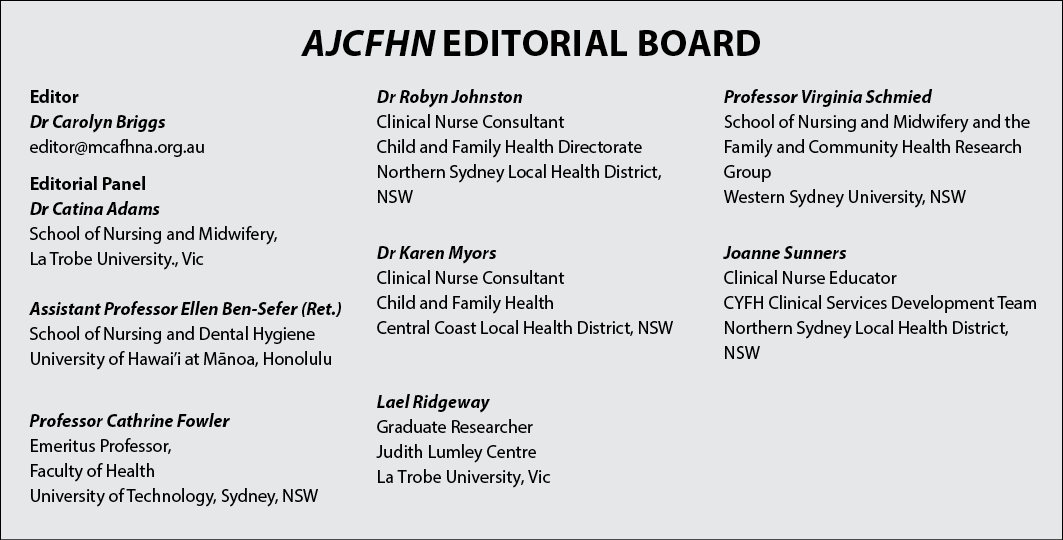Volume 19 Number 2
Editorial
Carolyn Briggs
For referencing Briggs C. Editorial. Australian Journal of Child and Family Health Nursing 2022; 19(2):2.
DOI https://doi.org/10.33235/ajcfhn.19.2.2
Families during COVID-19
A consistent theme in the last two issues of the journal has been the effect of the COVID‑19 pandemic on child and family health nursing service delivery in NSW. The health requirements implemented by State governments in Australia required community-based health services to reconfigure their mode of service delivery from primarily face-to-face delivery to telehealth. For maternal, child and family health services this meant that parent visits to community centres were replaced by electronic contact, and nurses had to rapidly become competent in managing online services.
The parents receiving the reconfigured maternal child and family health services were also having to adjust to a changed world. The effects of the ongoing pandemic on parenting confidence and capacity are now being documented and the evidence suggests there are some worrying negative outcomes. The most well known is the effect on the mental health of both caregivers and their children. Australian and international studies (Centre for Community Child Health 2022; Evans et al. 2020; Moltrecht et al. 2022; Olhaberry et al. 2021; van den Heuval et al. 2022) found that lockdowns and other social restrictions, such as limited contact with extended family and usual social outlets, affected both parents and children. Young children displayed higher levels of depression, anxiety, stress and negative behaviours, such as crying and tantrums, and were reported as having sleep difficulties. Parents complained of anxiety and depressive symptoms, experiencing feelings of sadness and irritability, and reported problems with daily functioning and capacity for emotional regulation.
A Norwegian study of parents of young children during the pandemic described the phenomenon as “parental burnout”, characterised by a mismatch between the demands and stressors put upon parents and the resources available to them to deal with them (Skjerdingstad et al. 2021). The pandemic placed increased demands upon parents, so that they found difficulty in meeting their own expectations of their parenting, thus leading to “burnout”. Younger parents, and parents who were unemployed or already coping with mental health problems, were reported as having the most difficulty.
An Australian longitudinal study (Westrupp et al. 2020) begun in April 2020 has been collecting data on the long-term effects of the pandemic on families. The first reports from the study indicated higher levels of depression, anxiety and stress in parents of young children, with higher rates of parental smoking and alcohol consumption. Parents were juggling the effects of the pandemic, paid work and caring for children at the same time, so it is little surprise they reported they were not coping well.
Not all families were affected in the same way by the pandemic. The above study (Westrupp et al. 2020) also gave some insight into the differing responses to the restrictions imposed by the pandemic lockdowns. Whilst many families reported mental health difficulties and strained family relationships, other families found positives in the extra family time from less time spent commuting and the quieter pace of family life. They saw benefits and opportunities for strengthening relationships and encouraging positive personal characteristics such as gratitude and tolerance (Evans et al. 2020).
The pandemic has affected all our lives and its effects are ongoing. The impact on parents and children and the subsequent government health measures will be far reaching and have not yet been fully played out or documented. The research indicates that the mental health and wellbeing of both parents and children were affected by the pandemic. As very young children are affected by parental anxiety and insensitive parenting caused by higher than normal levels of poor mental health, the final health burden of the pandemic may not be fully revealed until the next generation (van den Heuval et al. 2022).
Author(s)
Carolyn Briggs
Editor
References
Centre for Community Child Health 2022, The impact of the COVID‑19 pandemic on children in Australian early childhood education and care. Rapid review prepared by the Centre for Community Child Health, Murdoch Children’s Research Institute for the Commonwealth Department of Education, Skills and Employment.
Evans, S, Mikocka-Walus, A, Klas, A, Olive, L, Sciberras, E, Karantzas, G, Westrupp, EM 2020, ‘From “it has stopped our lives” to “spending more time together has strengthened our bonds”: The varied experiences of Australian families during COVID‑19’, Frontiers in Psychology, vol. 11, pp. 88667. doi:10.3389/fpsyg.2020.588667
Moltrecht, B, Dalton, LJ, Hanna, JR, Law, C, Rapa, E 2022, ‘Young parents’ experiences of pregnancy and parenting during the COVID‑19 pandemic: a qualitative study in the United Kingdom’, BMC Public Health, vol. 22, pp. 523. doi:10.1186/s12889-022-12892-9
Olhaberry, M, Sieverson C, Franco P, Romero M, Tagle T, Iribarren D, Honorato C, Muzard A 2022, ‘The impact of COVID‑19 on experiences of pregnancy and/or early parenting in Chile’. Infant Mental Health Journal, vol. 43, pp. 8–23. doi:10.1002/imhj.21955
Skjerdingstad, N, Johnson, MS, Johnson, SU, Hoffart, A, Ebrahimi, OV 2021, ‘Parental burnout during the COVID‑19 pandemic’, Family Process, vol. 00, pp. 1–15. doi:10.1111/famp.12740
van den Heuvel, MI, Vacaru, SV, Boekhorst, GBM, Cloin, M, van Bakel, H, Riem, MEM, de Weerth C, Beijers, R 2022. ‘Parents of young infants report poor mental health and more insensitive parenting during the first Covid‑19 lockdown’, BMC Pregnancy and Childbirth, vol. 22, p. 302. doi:10.1186/s12884-022-04618-x
Westrupp, E, Karantzas, G, Macdonald, J, Greenwood, C 2020, ‘Study protocol for the COVID‑19 Pandemic Adjustment Survey (CPAS): a longitudinal study of Australian parents of a child 0–18 years’, Frontiers in Psychiatry, August. doi:10.3389/fpsyt.2020.555750



